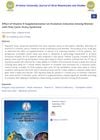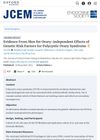 37 citations,
February 2007 in “Clinical Obstetrics and Gynecology”
37 citations,
February 2007 in “Clinical Obstetrics and Gynecology” The document concludes that treating PCOS requires a combination of drugs to manage reproductive and metabolic symptoms, with more research needed on combination therapies.
 34 citations,
January 2011 in “Fundamental & Clinical Pharmacology”
34 citations,
January 2011 in “Fundamental & Clinical Pharmacology” New treatments for PCOS show promise, but no current medication treats all aspects of the condition.
 28 citations,
January 2017 in “Indian Dermatology Online Journal”
28 citations,
January 2017 in “Indian Dermatology Online Journal” Skin problems like acne, excessive hair growth, and oily skin are common in women with PCOS and can help with early diagnosis.
 12 citations,
December 2005 in “PubMed”
12 citations,
December 2005 in “PubMed” Some men with early hair loss may have similar hormonal changes to women with Polycystic ovary syndrome, and could be at risk for developing type 2 diabetes.
 5 citations,
September 2021 in “Dermatology Reports”
5 citations,
September 2021 in “Dermatology Reports” Skin problems like acne and excess hair in PCOS are common and linked to being overweight.
 5 citations,
March 2020 in “Current Opinion in Endocrine and Metabolic Research”
5 citations,
March 2020 in “Current Opinion in Endocrine and Metabolic Research” Skin problems in PCOS, like excess hair, acne, and hair loss, may not always indicate high male hormone levels and need careful diagnosis for proper treatment.
 3 citations,
October 2018 in “Journal of Drug Delivery and Therapeutics”
3 citations,
October 2018 in “Journal of Drug Delivery and Therapeutics” People with polycystic ovary syndrome often experience anxiety and depression.
 2 citations,
December 2021 in “Cureus”
2 citations,
December 2021 in “Cureus” Most women with Polycystic Ovary Syndrome (PCOS) have skin issues like excessive hair, acne, or hair loss. Hormone imbalances are common, and age, certain hormones, and hormone ratios can predict acne. Obesity, infertility, and high cholesterol are also common in these women.
 1 citations,
August 2023 in “Curēus”
1 citations,
August 2023 in “Curēus” Metformin helps reduce PCOS-related infertility by improving insulin sensitivity and inducing ovulation.
 1 citations,
November 2017 in “International journal of clinical endocrinology and metabolism”
1 citations,
November 2017 in “International journal of clinical endocrinology and metabolism” The supplement with Myo-inositol and D-chiro-inositol improves metabolic symptoms in PCOS, especially when combined with metformin.
 September 2022 in “Al-Azhar University Journal of Virus Researches and Studies”
September 2022 in “Al-Azhar University Journal of Virus Researches and Studies” Taking Vitamin D with clomiphene citrate significantly improves ovulation in women with Poly Cystic Ovary Syndrome.
October 2019 in “Obsgyne Review Journal of Obstetric and Gynecology of Siddharth Health Research and Social Welfare Society” The document's conclusion cannot be provided as the content is not available for summarization.
 January 2019 in “Egyptian Journal of Obesity, Diabetes and Endocrinology”
January 2019 in “Egyptian Journal of Obesity, Diabetes and Endocrinology” People with polycystic ovary syndrome often have low levels of vitamin D.
 January 2017 in “Diabetes case reports”
January 2017 in “Diabetes case reports” OMICS International aims to freely share scientific research for everyone's access.
 January 2009 in “Elsevier eBooks”
January 2009 in “Elsevier eBooks” Some plant-based treatments may help with ovary function, insulin resistance, and excess male hormones in PCOS, but more research is needed to confirm their safety and effectiveness.
39 citations,
August 2001 in “Clinical endocrinology” Lean and obese women with PCOS have similar levels of insulin resistance, indicating it's a core aspect of the condition.
 11 citations,
November 2021 in “The Journal of Clinical Endocrinology and Metabolism”
11 citations,
November 2021 in “The Journal of Clinical Endocrinology and Metabolism” Genetic risk factors for Polycystic Ovary Syndrome can affect men too, not just women.
 114 citations,
January 2014 in “World Journal of Gastroenterology”
114 citations,
January 2014 in “World Journal of Gastroenterology” People with PCOS, especially if obese, often have NAFLD, linked to obesity, insulin resistance, and high androgen levels.
 36 citations,
May 2021 in “Nutrients”
36 citations,
May 2021 in “Nutrients” Natural molecules like inositols, resveratrol, vitamins, and omega-3 fatty acids may help manage Polycystic Ovary Syndrome (PCOS), but their effects vary and need more exploration.
 31 citations,
September 2006 in “International journal of gynaecology and obstetrics”
31 citations,
September 2006 in “International journal of gynaecology and obstetrics” New treatments for PCOS focus on insulin resistance and reducing testosterone levels, along with traditional hormone therapies.
 16 citations,
January 2007 in “Journal of Obstetrics and Gynaecology”
16 citations,
January 2007 in “Journal of Obstetrics and Gynaecology” The document suggests various treatments for PCOS, including medication for menstrual issues, insulin resistance, and excess hair, as well as fertility treatments, while highlighting the need for personalized care and lifestyle changes.
 4 citations,
April 2019 in “Gynecological Endocrinology”
4 citations,
April 2019 in “Gynecological Endocrinology” Certain gene variations are found in people with polycystic ovary syndrome.
 1 citations,
January 2023 in “Journal of the European Academy of Dermatology and Venereology”
1 citations,
January 2023 in “Journal of the European Academy of Dermatology and Venereology” The article concludes that more research is needed on how to diagnose and treat hair loss in women with polycystic ovary syndrome.
 February 2024 in “Journal of Education, Health and Sport”
February 2024 in “Journal of Education, Health and Sport” Different treatments for PCOS should be tailored to the individual, including lifestyle changes and various medications.
 July 2022 in “Fayoum University Medical Journal”
July 2022 in “Fayoum University Medical Journal” Different types of PCOS affect metabolic syndrome and pregnancy rates differently.
 April 2022 in “Reproductive health of woman”
April 2022 in “Reproductive health of woman” New methods for identifying and managing polycystic ovary syndrome in teenagers are improving.
 August 2021 in “Journal of maternal and child health”
August 2021 in “Journal of maternal and child health” Obesity increases the risk of polycystic ovary syndrome and anemia in women who can have children.
 January 2021 in “International Journal of Research in Pharmaceutical Sciences”
January 2021 in “International Journal of Research in Pharmaceutical Sciences” Changes in treatment and diagnosis improve Polycystic Ovary Syndrome.
 January 2021 in “International Journal of Research in Pharmaceutical Sciences”
January 2021 in “International Journal of Research in Pharmaceutical Sciences” Changes in treatment and diagnosis improve Polycystic Ovary Syndrome.
 August 2020 in “Journal of Shahid Sadoughi University of Medical Sciences”
August 2020 in “Journal of Shahid Sadoughi University of Medical Sciences” Oxidative stress contributes to Polycystic Ovary Syndrome.




























